- Home
- Joseph Conrad
Secret Agent Page 2
Secret Agent Read online
Page 2
Before reaching Knightsbridge, Mr. Verloc took a turn to the left out of the busy main thoroughfare, uproarious with the traffic of swaying omnibuses and trotting vans, into the almost silent, swift flow of hansoms. Under his hat, worn with a slight backward tilt, his hair had been carefully brushed into respectful sleekness; for his business was with an Embassy. And Mr. Verloc, steady like a rock—a soft kind of rock—marched now along a street which could with every propriety be described as private. In its breadth, emptiness, and extent it had the majesty of inorganic nature, of matter that never dies. The only reminder of mortality was a doctor’s brougham arrested in august solitude close to the curbstone. The polished knockers of the doors gleamed as far as the eye could reach, the clean windows shone with a dark opaque lustre. And all was still. But a milk cart rattled noisily across the distant perspective; a butcher boy, driving with the noble recklessness of a charioteer at Olympic Games, dashed round the corner sitting high above a pair of red wheels. A guilty-looking cat issuing from under the stones ran for a while in front of Mr. Verloc, then dived into another basement; and a thick police constable, looking a stranger to every emotion, as if he, too, were part of inorganic nature, surging apparently out of a lamp-post, took not the slightest notice of Mr. Verloc. With a turn to the left Mr. Verloc pursued his way along a narrow street by the side of a yellow wall which, for some inscrutable reason, had No. 1 Chesham Square written on it in black letters. Chesham Square was at least sixty yards away, and Mr. Verloc, cosmopolitan enough not to be deceived by London’s topographical mysteries, held on steadily, without a sign of surprise or indignation. At last, with business-like persistency, he reached the Square, and made diagonally for the number 10. This belonged to an imposing carriage gate in a high, clean wall between two houses, of which one rationally enough bore the number 9 and the other was numbered 37; but the fact that this last belonged to Porthill Street, a street well known in the neighbourhood, was proclaimed by an inscription placed above the ground-floor windows by whatever highly efficient authority is charged with the duty of keeping track of London’s strayed houses. Why powers are not asked of Parliament (a short act would do) for compelling those edifices to return where they belong is one of the mysteries of municipal administration. Mr. Verloc did not trouble his head about it, his mission in life being the protection of the social mechanism, not its perfectionment or even its criticism.
It was so early that the porter of the Embassy issued hurriedly out of his lodge still struggling with the left sleeve of his livery coat. His waistcoat was red, and he wore knee-breeches, but his aspect was flustered. Mr. Verloc, aware of the rush on his flank, drove it off by simply holding out an envelope stamped with the arms of the Embassy, and passed on. He produced the same talisman also to the footman who opened the door, and stood back to let him enter the hall.
A clear fire burned in a tall fireplace, and an elderly man standing with his back to it, in evening dress and with a chain round his neck, glanced up from the newspaper he was holding spread out in both hands before his calm and severe face. He didn’t move; but another lackey, in brown trousers and claw-hammer coat edged with thin yellow cord, approaching Mr. Verloc listened to the murmur of his name, and turning round on his heel in silence, began to walk, without looking back once. Mr. Verloc, thus led along a ground-floor passage to the left of the great carpeted staircase, was suddenly motioned to enter a quite small room furnished with a heavy writing-table and a few chairs. The servant shut the door, and Mr. Verloc remained alone. He did not take a seat. With his hat and stick held in one hand he glanced about, passing his other podgy hand over his uncovered sleek head.
Another door opened noiselessly, and Mr. Verloc immobilizing his glance in that direction saw at first only black clothes, the bald top of a head, and a drooping dark grey whisker on each side of a pair of wrinkled hands. The person who had entered was holding a batch of papers before his eyes and walked up to the table with a rather mincing step, turning the papers over the while. Privy Councillor Wurmt, Chancelier d’Ambassade, was rather shortsighted. This meritorious official, laying the papers on the table, disclosed a face of pasty complexion and of melancholy ugliness surrounded by a lot of fine, long dark grey hairs, barred heavily by thick and bushy eyebrows. He put on a black-framed pince-nez upon a blunt and shapeless nose, and seemed struck by Mr. Verloc’s appearance. Under the enormous eyebrows his weak eyes blinked pathetically through the glasses.
He made no sign of greeting; neither did Mr. Verloc who certainly knew his place; but a subtle change about the general outlines of his shoulders and back suggested a slight bending of Mr. Verloc’s spine under the vast surface of his overcoat. The effect was of unobtrusive deference.
“I have here some of your reports,” said the bureaucrat in an unexpectedly soft and weary voice, and pressing the tip of his forefinger on the papers with force. He paused; and Mr. Verloc, who had recognized his own handwriting very well, waited in an almost breathless silence. “We are not very satisfied with the attitude of the police here,” the other continued, with every appearance of mental fatigue.
The shoulders of Mr. Verloc, without actually moving, suggested a shrug. And for the first time since he left his home that morning his lips opened.
“Every country has its police,” he said, philosophically. But as the official of the Embassy went on blinking at him steadily he felt constrained to add: “Allow me to observe that I have no means of action upon the police here.”
“What is desired,” said the man of papers, “is the occurrence of something definite which should stimulate their vigilance. That is within your province—is it not so?”
Mr. Verloc made no answer except by a sigh, which escaped him involuntarily, for instantly he tried to give his face a cheerful expression. The official blinked doubtfully, as if affected by the dim light of the room. He repeated vaguely:
“The vigilance of the police—and the severity of the magistrates. The general leniency of the judicial procedure here, and the utter absence of all repressive measures, are a scandal to Europe. What is wished for just now is the accentuation of the unrest—of the fermentation which undoubtedly exists——”
“Undoubtedly, undoubtedly,” broke in Mr. Verloc in a deep, deferential bass of an oratorical quality, so utterly different from the tone in which he had spoken before that his interlocutor remained profoundly surprised. “It exists to a dangerous degree. My reports for the last twelve months make it sufficiently clear.”
“Your reports for the last twelve months,” State Councillor Wurmt began in his gentle and dispassionate tone, “have been read by me. I failed to discover why you wrote them at all.”
A sad silence reigned for a time. Mr. Verloc seemed to have swallowed his tongue, and the other gazed at the papers on the table fixedly. At last he gave them a slight push.
“That state of affairs you expose there is assumed to exist as the first condition of your employment. What is required at present is not writing, but the bringing to light of a distinct, significant fact—I would almost say of an alarming fact.”
“I need not say that all my endeavours shall be directed to that end,” Mr. Verloc said, with convinced modulations in his conversational husky tone. But the sense of being blinked at watchfully behind the blind glitter of these eyeglasses on the other side of the table disconcerted him. He stopped short with a gesture of absolute devotion. The useful hard-working, if obscure member of the Embassy had an air of being impressed by some newly-born thought.
“You are very corpulent,” he said.
This observation, really of a psychological nature, and advanced with the modest hesitation of an officeman more familiar with ink and paper than with the requirements of active life, stung Mr. Verloc in the manner of a rude personal remark. He stepped back a pace.
“Eh? What were you pleased to say?” he exclaimed, with husky resentment.
The Chancelier d’Ambassade, entrusted with the conduct of this interview, seemed
to find it too much for him.
“I think,” he said, “that you had better see Mr. Vladimir. Yes, decidedly I think you ought to see Mr. Vladimir. Be good enough to wait here,” he added, and went out with mincing steps.
At once Mr. Verloc passed his hand over his hair. A slight perspiration had broken out on his forehead. He let the air escape from his pursed-up lips like a man blowing at a spoonful of hot soup. But when the servant in brown appeared at the door silently, Mr. Verloc had not moved an inch from the place he had occupied throughout the interview. He had remained motionless, as if feeling himself surrounded by pitfalls.
He walked along a passage lighted by a lonely gas-jet, then up a flight of winding stairs, and through a glazed and cheerful corridor on the first floor. The footman threw open a door, and stood aside. The feet of Mr. Verloc felt a thick carpet. The room was large, with three windows; and a young man with a shaven, big face, sitting in a roomy arm-chair before a vast mahogany writing-table, said in French to the Chancelier d’Ambassade, who was going out with the papers in his hand:
“You are quite right, mon cher. He’s fat—the animal.”
Mr. Vladimir, First Secretary, had a drawing-room reputation as an agreeable and entertaining man. He was something of a favourite in society. His wit consisted in discovering droll connections between incongruous ideas; and when talking in that strain he sat well forward on his seat, with his left hand raised, as if exhibiting his funny demonstrations between the thumb and forefinger, while his round and clean-shaven face wore an expression of merry perplexity.
But there was no trace of merriment or perplexity in the way he looked at Mr. Verloc. Lying far back in the deep armchair, with squarely spread elbows, and throwing one leg over a thick knee, he had with his smooth and rosy countenance the air of a preternaturally thriving baby that will not stand nonsense from anybody.
“You understand French, I suppose?” he said.
Mr. Verloc stated huskily that he did. His whole vast bulk had a forward inclination. He stood on the carpet in the middle of the room, clutching his hat and stick in one hand; the other hung lifelessly by his side. He muttered unobtrusively somewhere deep down in his throat something about having done his military service in the French artillery. At once, with contemptuous perversity, Mr. Vladimir changed the language, and began to speak idiomatic English without the slightest trace of a foreign accent.
“Ah! Yes. Of course. Let’s see. How much did you get for obtaining the design of the improved breech-block of their new field-gun?”
“Five years’ rigorous confinement in a fortress,” Mr. Verloc answered, unexpectedly, but without any sign of feeling.
“You got off easily,” was Mr. Vladimir’s comment. “And, anyhow, it served you right for letting yourself get caught. What made you go in for that sort of thing—eh?”
Mr. Verloc’s husky conversational voice was heard speaking of youth, of a fatal infatuation for an unworthy——
“Aha! Cherchez la femme,” Mr. Vladimir deigned to interrupt, unbending, but without affability; there was, on the contrary, a touch of grimness in his condescension. “How long have you been employed by the Embassy here?” he asked.
“Ever since the time of the late Baron Stott-Wartenheim,” Mr. Verloc answered in subdued tones, and protruding his lips sadly, in sign of sorrow for the deceased diplomat. The First Secretary observed this play of physiognomy steadily.
“Ah! ever since. . . . Well! What have you got to say for yourself?” he asked, sharply.
Mr. Verloc answered with some surprise that he was not aware of having anything special to say. He had been summoned by a letter—— And he plunged his hand busily into the side pocket of his overcoat, but before the mocking, cynical watchfulness of Mr. Vladimir, concluded to leave it there.
“Bah!” said the latter. “What do you mean by getting out of condition like this? You haven’t got even the physique of your profession. You—a member of a starving proletariat—never! You—a desperate socialist or anarchist—which is it?”
“Anarchist,” stated Mr. Verloc in a deadened tone.
“Bosh!” went on Mr. Vladimir, without raising his voice. “You startled old Wurmt himself. You wouldn’t deceive an idiot. They all are that by-the-by, but you seem to me simply impossible. So you began your connection with us by stealing the French gun designs. And you got yourself caught. That must have been very disagreeable to our Government. You don’t seem to be very smart.”
Mr. Verloc tried to exculpate himself huskily.
“As I’ve had occasion to observe before, a fatal infatuation for an unworthy——”
Mr. Vladimir raised a large, white, plump hand.
“Ah, yes. The unlucky attachment—of your youth. She got hold of the money, and then sold you to the police—eh?”
The doleful change in Mr. Verloc’s physiognomy, the momentary drooping of his whole person, confessed that such was the regrettable case. Mr. Vladimir’s hand clasped the ankle reposing on his knee. The sock was of dark blue silk.
“You see, that was not very clever of you. Perhaps you are too susceptible.”
Mr. Verloc intimated in a throaty, veiled murmur that he was no longer young.
“Oh! That’s a failing which age does not cure,” Mr. Vladimir remarked, with sinister familiarity. “But no! You are too fat for that. You could not have come to look like this if you had been at all susceptible. I’ll tell you what I think is the matter: you are a lazy fellow. How long have you been drawing pay from this Embassy?”
“Eleven years,” was the answer, after a moment of sulky hesitation. “I’ve been charged with several missions to London while His Excellency Baron Stott-Wartenheim was still Ambassador in Paris. Then by his Excellency’s instructions I settled down in London. I am English.”
“You are! Are you? Eh?”
“A natural-born British subject,” Mr. Verloc said, stolidly. “But my father was French, and so——”
“Never mind explaining,” interrupted the other. “I daresay you could have been legally a Marshal of France and a Member of Parliament in England—and then, indeed, you would have been of some use to our Embassy.”
This flight of fancy provoked something like a faint smile on Mr. Verloc’s face. Mr. Vladimir retained an imperturbable gravity.
“But, as I’ve said, you are a lazy fellow; you don’t use your opportunities. In the time of Baron Stott-Wartenheim we had a lot of soft-headed people running this Embassy. They caused fellows of your sort to form a false conception of the nature of a secret service fund. It is my business to correct this misapprehension by telling you what the secret service is not. It is not a philanthropic institution. I’ve had you called here on purpose to tell you this.”
Mr. Vladimir observed the forced expression of bewilderment on Verloc’s face, and smiled sarcastically.
“I see that you understand me perfectly. I daresay you are intelligent enough for your work. What we want now is activity—activity.”
On repeating this last word Mr. Vladimir laid a long white forefinger on the edge of the desk. Every trace of huskiness disappeared from Verloc’s voice. The nape of his gross neck became crimson above the velvet collar of his overcoat. His lips quivered before they came widely open.
“If you’ll only be good enough to look up my record,” he boomed out in his great, clear, oratorical bass, “you’ll see I gave a warning only three months ago on the occasion of the Grand Duke Romuald’s visit to Paris, which was telegraphed from here to the French police, and——”
“Tut, tut!” broke out Mr. Vladimir, with a frowning grimace. “The French police had no use for your warning. Don’t roar like this. What the devil do you mean?”
With a note of proud humility Mr. Verloc apologized for forgetting himself. His voice, famous for years at open-air meetings and at workmen’s assemblies in large halls, had contributed, he said, to his reputation of a good and trustworthy comrade. It was, therefore, a part of his usefulness. It had inspir
ed confidence in his principles. “I was always put up to speak by the leaders at a critical moment,” Mr. Verloc declared, with obvious satisfaction. There was no uproar above which he could not make himself heard, he added; and suddenly he made a demonstration.
“Allow me,” he said. With lowered forehead, without looking up, swiftly and ponderously, he crossed the room to one of the French windows. As if giving way to an uncontrollable impulse, he opened it a little. Mr. Vladimir, jumping up amazed from the depths of the armchair, looked over his shoulder; and below, across the courtyard of the Embassy, well beyond the open gate, could be seen the broad back of a policeman watching idly the gorgeous perambulator of a wealthy baby being wheeled in state across the Square.
“Constable!” said Mr. Verloc, with no more effort than if he were whispering; and Mr. Vladimir burst into a laugh on seeing the policeman spin round as if prodded by a sharp instrument. Mr. Verloc shut the window quietly, and returned to the middle of the room.
“With a voice like that,” he said, putting on the husky conversational pedal, “I was naturally trusted. And I knew what to say, too.”
Mr. Vladimir, arranging his cravat, observed him in the glass over the mantelpiece.
“I daresay you have the social revolutionary jargon by heart well enough,” he said, contemptuously. “Vox et. . . . You haven’t ever studied Latin—have you?”
“No,” growled Mr. Verloc. “You did not expect me to know it. I belong to the million. Who knows Latin? Only a few hundred imbeciles who aren’t fit to take care of themselves.”
For some thirty seconds longer Mr. Vladimir studied in the mirror the fleshy profile, the gross bulk, of the man behind him. And at the same time he had the advantage of seeing his own face, clean-shaved and round, rosy about the gills, and with the thin, sensitive lips formed exactly for the utterance of those delicate witticisms which had made him such a favourite in the very highest society. Then he turned, and advanced into the room with such determination that the very ends of his quaintly old-fashioned bow necktie seemed to bristle with unspeakable menaces. The movement was so swift and fierce that Mr. Verloc, casting an oblique glance, quailed inwardly.

 Heart of Darkness
Heart of Darkness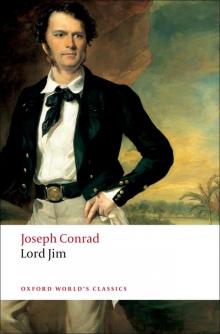 Lord Jim
Lord Jim The Nigger of the Narcissus (Echo Library)
The Nigger of the Narcissus (Echo Library) Victory (Dover Thrift Editions)
Victory (Dover Thrift Editions) Secret Agent
Secret Agent Nostromo
Nostromo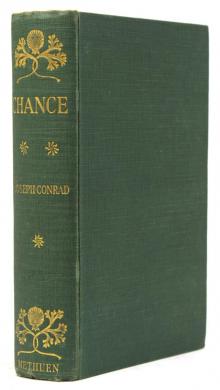 Chance: A Tale in Two Parts
Chance: A Tale in Two Parts Youth
Youth Almayer's Folly
Almayer's Folly The Heart of Darkness and the Secret Sharer
The Heart of Darkness and the Secret Sharer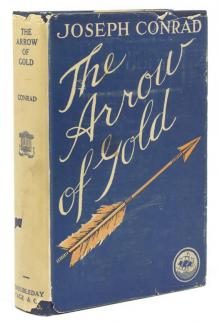 The Arrow of Gold: A Story Between Two Notes
The Arrow of Gold: A Story Between Two Notes The Rescue: A Romance of the Shallows
The Rescue: A Romance of the Shallows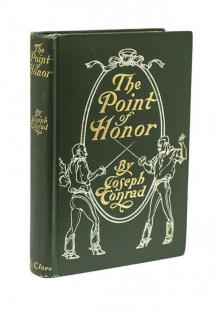 The Point Of Honor: A Military Tale
The Point Of Honor: A Military Tale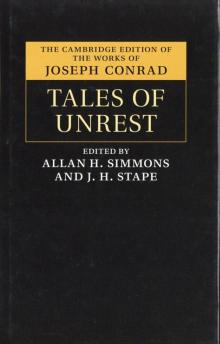 Tales of Unrest
Tales of Unrest Under Western Eyes
Under Western Eyes Gaspar Ruiz
Gaspar Ruiz A Set of Six
A Set of Six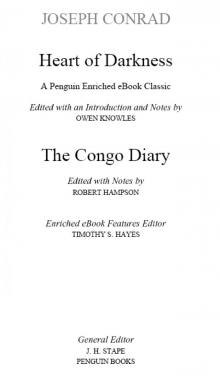 Heart of Darkness and the Congo Diary (Penguin Classics)
Heart of Darkness and the Congo Diary (Penguin Classics) Heart of Darkness and Selected Short Fiction
Heart of Darkness and Selected Short Fiction Typhoon
Typhoon Youth, a Narrative
Youth, a Narrative Tomorrow
Tomorrow The Arrow of Gold
The Arrow of Gold The Shadow Line: A Confession
The Shadow Line: A Confession The Rescue
The Rescue Victory (Echo Library)
Victory (Echo Library) The Brute
The Brute Romance
Romance A Personal Record
A Personal Record Lord Jim: A Tale
Lord Jim: A Tale Heart of Darkness and Selected Short Fiction (Barnes & Noble Classics Series)
Heart of Darkness and Selected Short Fiction (Barnes & Noble Classics Series) Within the Tides
Within the Tides The Secret Sharer and Other Stories
The Secret Sharer and Other Stories Falk
Falk Heart of Darkness and The Secret Sharer
Heart of Darkness and The Secret Sharer Chance
Chance An Anarchist
An Anarchist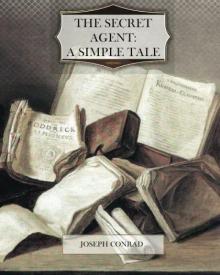 The Secret Agent: A Simple Tale
The Secret Agent: A Simple Tale The Secret Agent
The Secret Agent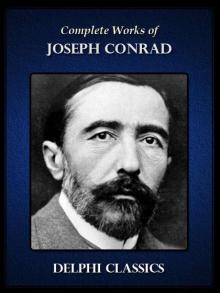 Complete Works of Joseph Conrad (Illustrated)
Complete Works of Joseph Conrad (Illustrated)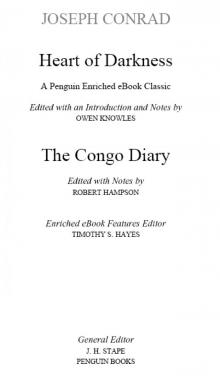 Heart of Darkness and the Congo Diary
Heart of Darkness and the Congo Diary Notes on Life & Letters
Notes on Life & Letters Typhoon (Single Story)
Typhoon (Single Story)